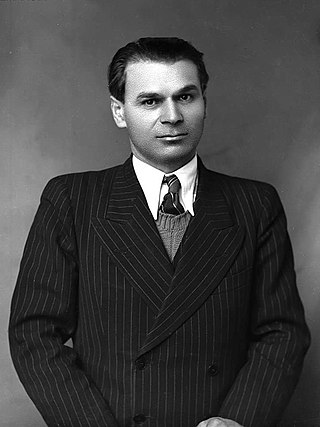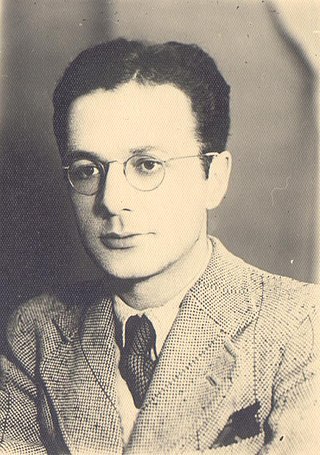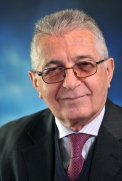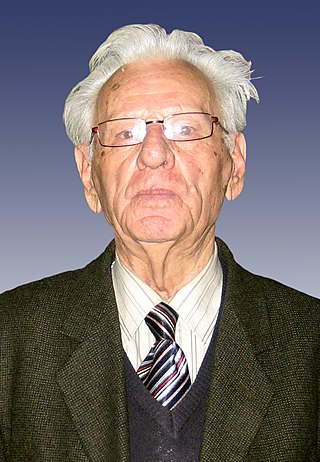
Ismail Kadare was an Albanian novelist, poet, essayist, screenwriter, and playwright. He was a leading international literary figure and intellectual. He focused on poetry until the publication of his first novel, The General of the Dead Army, which made him famous internationally.

Robert Elsie was a Canadian-born German scholar who specialized in Albanian literature and folklore.

Mehdi Bardhi was a Kosovar linguist, author, and teacher.
Bilal Xhaferi, often referred to as Bilal Xhaferri, was an Albanian writer and political dissident against the Albanian communist regime. He is seen as the representative poet of the Albanian Chameria.
A bejtexhi was a popular bard of the Muslim tradition in Ottoman Albania. The genre of literature created by bejtexhinj in the 18th century prevailed in different cities of what is now Albania, Kosovo, Chameria as well as in religious centers.

Dhimitër Pasko was a well-known Albanian writer, literary critic and translator. Along with Ernest Koliqi he is considered as the founder of modern Albanian prose; in Albanian literature his pen name for which he gained fame was Mitrush Kuteli.

Llazar Sotir Gusho, commonly known by the pen name Lasgush Poradeci, was an Albanian philologist, poet, translator, writer and pioneer of modern Albanian literature. He is regarded as one of the most influential Albanian writers of the 20th century whose works are directly connected with Romanticism and Realism.

Dhimitër Shuteriqi was an Albanian scholar, literary historian, and writer. He participated in the anti-fascist National Liberation Movement. After the war, he was a member of the People's Assembly and one of the founders and later president of the Albanian League of Writers and Artists. In addition to a series of books and novels, he has published numerous volumes of textbooks, especially those on the History of Albanian Literature for high schools.
Esad Mekuli was an Albanian poet, critic and translator. He was the first president of the Academy of Sciences and Arts of Kosovo. Robert Elsie considered him the father of modern Albanian poetry in Yugoslavia, and his influence in Kosovo remains immense.

Sterjo Spasse was an Albanian prose writer and novelist.
The literature of Kosovo is composed of literary texts written in Albanian, Serbian, Bosnian, and Turkish, specifically by authors of Kosovo. Kosovo produced several prominent writers in the Ottoman era. However, Ottoman authorities banned the written use of the Albanian language until 1912. This policy continued during Serb rule until the outbreak of World War II.
Constantine of Berat, known among Albanians as Kostandin Jermonak Berati or shortly Kostë Berati, was an Albanian writer and translator of the 18th century.

Jorgo Bulo was an Albanian philologist, historian, and literary critic. Since 2003 up to his death (2015) he was a member of the Albanian Academy of Arts and Sciences.

The Albanian Orthography Congress was a linguistics event held in Tirana, People's Republic of Albania, in 1972. It established for the first time the unified orthographic rules of the Albanian language which are still in use today.

Idriz Ajeti was an Albanologist from Kosovo and one of the main researchers and authorities on the Albanian language studies of post World War II. He was involved for a long period in the academic life of the University of Pristina, and was a member of the Academy of Sciences and Arts of Kosovo, being its chairman for seven years.

Kadrush Radogoshi is an Albanian poet, novelist, play-writer, and literary critic from Kosovo. He is a dissident who opposed the revocation of the autonomy of Kosovo from the Milosevic's regime, consequently being arrested and imprisoned. Radogoshi served as President of Writers' Union of Kosovo. In 2010, he settled in Canada.

Ag Apolloni is an Albanian writer, poet, playwright, scholar, and essay writer. He is a professor at the University of Prishtina, Kosovo. His literary works are widely acclaimed for their dramatic dimension, philosophical treatment, and critical attitude towards history, politics, and society.
Mehmet Kraja is an Albanian writer, literary critic and journalist. He is the current president of the Academy of Sciences and Arts of Kosovo.
The Prishtina Normal School was a teachers' college in Kosovo, established on 17 December 1941, during the Italian occupation of Kosovo. It was a cornerstone in the development of the educational system in Kosovo and in the region. Initially created to address the critical need for qualified teachers in Kosovo's Albanian schools, the institution quickly became a vital academic, educational and cultural hub. Over the years, it played a significant role in training educators and fostering intellectual growth, leaving a lasting legacy through its distinguished alumni and contributions to Kosovo's educational system. Between 1946 and 1953, the school operated in Gjakova. The Prishtina Normal School ceased to exist in 1974.












